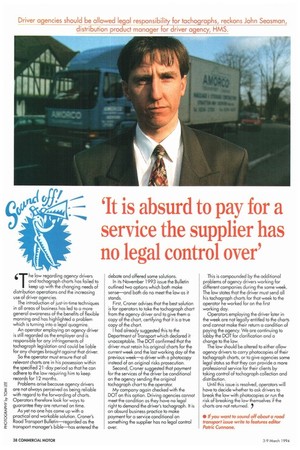'It is absurd to pay for a service the supplier has no legal control over'
Page 42

If you've noticed an error in this article please click here to report it so we can fix it.
6 he law regarding agency drivers
and tachograph charts has foiled to keep up with the changing needs of distribution operations and the increasing use of driver agencies. The introduction of just-in-time techniques in all areas of business has led to a more general awareness of the benefits of flexible manning and has highlighted a problem which is turning into a legal quagmire. An operator employing an agency driver is still regarded as the employer and is responsible for any infringements of tachograph legislation and could be liable for any charges brought against that driver. So the operator must ensure that all relevant charts are in his possession within the specified 21 -day period so that he can adhere to the law requiring him to keep records for 12 months.
Problems arise because agency drivers are not always perceived as being reliable with regard to the forwarding of charts. Operators therefore look for ways to guarantee they are returned on time.
As yet no one has come up with a practical and workable solution. Croner's Road Transport Bulletin—regarded as the transport manager's bible—has entered the debate and offered some solutions.
In its November 1993 issue the Bulletin outlined two options which both make sense—and both do no meet the law as it stands.
First, Croner advises that the best solution is for operators to take the tachograph chart From the agency driver and to give them a copy of the chart, certifying that it is a true copy of the chart.
I had already suggested this to the Department of Transport which declared it unacceptable. The DOT confirmed that the driver must retain his original charts for the current week and the last working day of the previous week—a driver with a photocopy instead of an original risks prosecution, Second, Croner suggested that payment for the services of the driver be conditional on the agency sending the original tachograph chart to the operator. My company again checked with the DOT on this option. Driving agencies cannot meet the condition as they have no legal right to demand the driver's tachograph. It is an absurd business practice to make payment for a service conditional on something the supplier has no legal control over. This is compounded by the additional problems of agency drivers working for different companies during the same week. The law states that the driver must send all his tachograph charts for that week to the operator he worked for on the first working day. Operators employing the driver later in the week are not legally entitled to the charts and cannot make their return a condition of paying the agency. We are continuing to lobby the DOT for clarification and a change to the law. The law should be altered to either allow agency drivers to carry photocopies of their tachograph charts, or to give agencies some legal status so that they can provide a more professional service for their clients by taking control of tachograph collection and distribution.
Until this issue is resolved, operators will have to decide whether to ask drivers to break the law with photocopies or run the risk of breaking the law themselves if the charts are not returned.
















































































